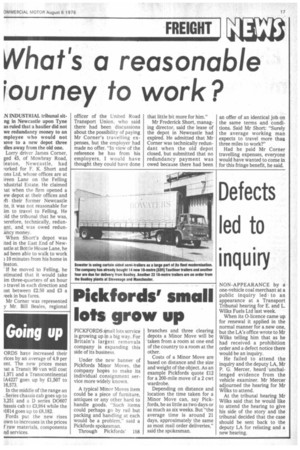What's a reasonable ourney to work?
Page 19

If you've noticed an error in this article please click here to report it so we can fix it.
,N INDUSTRIAL tribunal sitng in Newcastle upon Tyne as ruled that a haulier did not we redundancy money to an mployee who would not love to a new depot three tiles away from the old one. Lorry driver James Corner, ged 45, of Mowbray Road, leaton, Newcastle, had torked for F. K. Short and ons Ltd, whose offices are at ;reen Lane on the Felling ldustrial Estate. He claimed lat when the firm opened a ew depot at their offices and lt their former Newcastle ite, it was not reasonable for im to travel to Felling. He )Id the tribunal that he was, ierefore, technically, redunant, and was owed redunancy money.
When Short's depot was ited in the East End of Newastle at Bottle House Lane, he ad been able to walk to work 110 minutes from his home in Leaton.
If he moved to Felling, he stimated that it would take im three-quarters of an hour ) travel in each direction and ost between £2.50 and £3 a ieek in bus fares.
Mr Corner was represented y Mr. Bill Beales, regional officer of the United Road Transport Union, who said there had been discussions about the possibility of paying Mr Corner's travelling expenses, but the employer had made no offer. "In view of the reference he has from his employers, I would have thought they could have done that little bit more for him."
Mr Frederick Short, managing director, said the lease of the depot in Newcastle had expired. He admitted that Mr Corner was technically redundant when the old depot closed, but submitted that no redundancy payment was owed because there had been an offer of an identical job on the same terms and conditions. Said Mr Short: "Surely the average working man expects to travel more than three miles to work?"
Had he paid Mr Corner travelling expenses, everyone would have wanted to come in for this fringe benefit, he said.




















































































